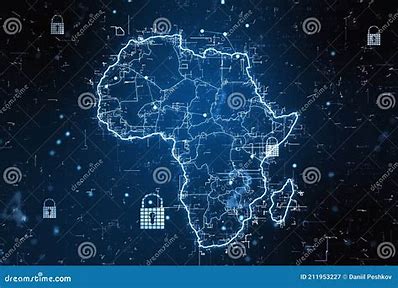Cybersecurity in 2025: The 7 Threats and Trends Africa Can’t Ignore
By Rebecca Aboagyewah Oppong | Veebeckz Tech Media | Published on 25th May, 2025
Executive Summary
Africa’s digital economy is thriving—but so is cybercrime. In 2025, new and evolving threats are forcing businesses, governments, and individuals to rethink digital safety. This article explores the top cybersecurity trends, challenges, and innovations that will shape Africa’s security posture in the years ahead.
Introduction: Digital Growth Meets Digital Risk
As Africa accelerates its digital transformation—from mobile money to AI-powered services—cybersecurity is no longer optional. It is essential. In 2025, cyberattacks are more sophisticated, more targeted, and increasingly powered by AI. Ghana, like many nations, stands at a critical point: secure the future, or risk losing it.
1. AI-Powered Attacks Are the New Normal
Hackers are now using AI to generate highly realistic phishing emails, deepfake audio for scams, and automated malware deployment.
What’s new in 2025: AI models trained to bypass detection tools
Local concern: Email scams and social media impersonations are becoming harder to detect for even tech-savvy users
Action: Organizations must use AI for defense too—tools like AI anomaly detection and behavior analytics.
2. Ransomware-as-a-Service (RaaS) is Growing
Ransomware is no longer just for advanced hackers—there’s now a “subscription model” on the dark web for it.
Targeted sectors in Africa: Healthcare, education, local banks, and fintech
Ghana case study: Two regional banks suffered ransomware disruptions in late 2024, prompting digital forensics investigations.
Action: Regular data backups, employee training, and patch management are critical.
3. Cloud Security Becomes a Boardroom Topic
With more startups and SMEs in Ghana migrating to AWS, Google Cloud, and Microsoft Azure, misconfigured cloud environments are now a top threat.
Common risks: Publicly exposed files, outdated security settings, weak access controls
Trend: Cyber insurance now includes cloud breach clauses
Action: Companies must invest in cloud security audits and DevSecOps best practices.
4. SIM Swap and Mobile Wallet Fraud Explodes
With nearly 80% of Ghanaians using mobile money platforms, attackers are exploiting weaknesses in SIM security.
Modus operandi: Fake ID + insider telecom access = SIM hijack
Result: Instant access to your bank, email, and social media
Solution: Telcos and fintechs must adopt biometric verification and MFA beyond SMS.
5. Cybersecurity Talent Shortage is a Crisis
In 2025, Africa faces a shortfall of over 500,000 cybersecurity professionals.
Why it matters: Without trained local experts, governments and companies rely on costly outsourcing
Opportunity: Youth in tech hubs like Veebeckz can fill the gap with training in ethical hacking, incident response, and compliance.
Highlight: New online programs like AfricaHackon Academy and Google Cybersecurity Certificates are now available.
6. Regulatory Pressure and Compliance Fatigue
Governments across Africa are pushing new data protection and cybersecurity laws.
Ghana’s CSA is now enforcing stricter rules for fintech, e-commerce, and healthcare systems
Challenge: Many SMEs don’t understand or comply with regulations, risking fines or shutdowns
Trend: “Cyber compliance-as-a-service” firms are emerging to help navigate complex laws.
7. Cyber Resilience Goes Local and Grassroots
In 2025, resilience is not just about having antivirus software—it’s about having a cybersecurity culture.
Trend: Schools introducing “cyber hygiene” in ICT classes
Communities: Tech hubs, churches, and local associations hosting digital safety workshops
Vision: A digitally literate Ghana where every citizen becomes a cybersecurity ambassador.
Conclusion: The Future is Digital, But Only If It’s Secure
Africa’s innovation is unstoppable—but it must be protected. In 2025, cybersecurity isn’t just a technical problem—it’s a leadership priority, an economic pillar, and a human rights issue. Whether you're a developer, CEO, teacher, or student, cybersecurity is your responsibility too.
Let’s secure Africa’s future—block by block, byte by byte.
